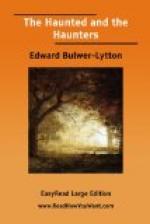XLII
THE VISION OF CHARLES XI. OF SWEDEN
From a Proces-verbal
The authenticity of the following narrative rests upon a proces-verbal, drawn out in form, and attested by the signatures of four credible witnesses.
Charles XI. was one of the most despotic and, at the same time, one of the ablest monarchs that ever ruled the destinies of Sweden. History represents him as brave and enlightened, but of a harsh and inflexible disposition; regulating his opinions by positive facts, and wholly ungifted with imagination. At the period of which we are about to speak, death had bereaved him of his Queen, Ulrica Eleonora. Notwithstanding the harshness which had marked his conduct to the Princess during her lifetime, and which, in the opinion of his subjects, had precipitated her into the grave, Charles revered her memory, and appeared more affected by her loss than might have been imagined from the natural sternness of his character. Subsequently to this event, he became more gloomy and taciturn than before, and devoted himself to study with an intensity of application that evinced his anxiety to escape the tortures of his own painful reflections. Towards the close of a dreary autumnal evening, the king, in slippers and robe de chambre, was seated before a large fire, in a private cabinet of his palace at Stockholm. Near him were his grand chamberlain, the Count de Brahe, who was honoured with the favourite estimation of his sovereign, and the principal state physician, Baumgarten, a learned disciple of Hippocrates, who aimed at the reputation of an esprit fort, and who would have pardoned a disbelief in anything except in the efficacy of his own prescriptions. The last-mentioned personage had on that evening been hastily summoned to the presence of the monarch, who felt or fancied himself in need of his professional skill. The evening was already far advanced, and the king, contrary to his wont, delayed bidding the customary “goodnight to all,”—the well-understood signal at which his guests always retired. With his head bent down, and his eyes fixed upon the decaying embers, that gradually withdrew even their mockery of warmth from the spacious fireplace, he maintained a strict silence, evidently fatigued with his company, yet dreading, though he scarcely knew why, to be left alone. The grand chamberlain, who perceived that even his profound remarks failed to excite the attention of the monarch, ventured to hint that his majesty would do well to seek repose; a gesture of the king retained him in his place. The physician, in his turn, hazarded a casual observation on the injurious tendency of late hours. The significant innuendoes were, however, thrown away on Charles, who replied to them by muttering between his teeth, “You may remain; I have no wish to sleep.” This permission, with which the drowsy courtiers would




